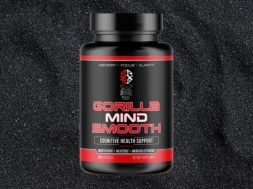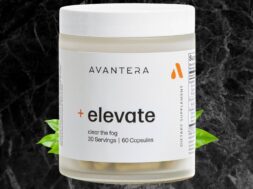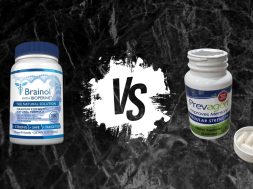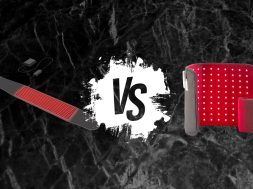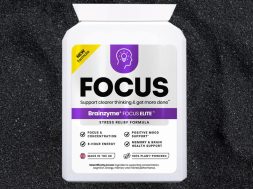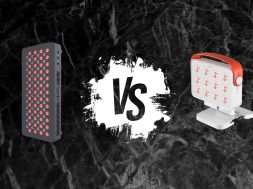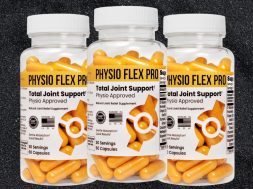
As a coach, grappler, and dad, I need my brain firing as much as my body. Training and family life are demanding, and when it comes time to sit down and work, mental energy often runs out first. That’s why I’ve tested a wide range of nootropics – some work, some don’t, and many try to impress with long ingredient lists but fall short in practice.
Brainol is one of those all-in-one formulas that promises focus, memory, mood, and energy in a single stack. It packs vitamins, amino acids, herbal extracts, and stimulants into two daily capsules. On paper, it looks complete. But as with all supplements, the question is whether the ingredients are in the right forms and doses to actually deliver results.
Quick Verdict
Brainol looks strong at first glance: a transparent label, a mix of classic nootropics, and a money-back guarantee. The guarana–theanine combo offers a clean lift, and phosphatidylserine is a legitimate brain-support ingredient.
The problems are bigger than the positives, though. Bacopa, tyrosine, carnitine, and choline are all far below proven doses. The formula feels broad but shallow, with lots of names but little substance where it counts.
For short-term focus, Brainol may help. For daily, safe, and consistent cognitive support, Mind Lab Pro is the better choice. It’s cleaner, better dosed, and more in line with research, making it a smarter long-term investment.
Pros
- Transparent label with no proprietary blends
- Includes phosphatidylserine at a usable dose
- Guarana + L-theanine provides a smooth focus boost
- Doubles as a high-dose B-complex for those with nutrient gaps
- Backed by a 60-day money-back guarantee
Cons
- Many ingredients are severely underdosed (Bacopa, tyrosine, ALCAR, choline)
- Magnesium oxide form has poor absorption
- St. John’s Wort raises significant drug-interaction risks
- Huperzine A dose is too high for safe long-term use
- Effects fade quickly; limited long-term memory support
What Is Brainol?
Brainol is a nootropic supplement from Consumer Health, designed as an “all-in-one” formula for focus, memory, mood, and mental energy. Each bottle holds 60 capsules (a one-month supply at two per day).
The formula blends vitamins, minerals, amino acids, herbal extracts, and a few advanced nootropics like phosphatidylserine and huperzine A. Unlike many competitors, Brainol lists all dosages openly with no proprietary blends, so you can see exactly what you’re getting. That transparency is a plus, but it also makes clear that many ingredients are far below effective study doses.
Brainol is sold mainly through the official website, backed by a 60-day money-back guarantee, and occasionally through Amazon. On paper it promises a convenient daily brain booster, but whether it delivers depends on how closely you look at the research behind its dosages.
Brainol Ingredients
Brainol’s formula is packed with familiar names: vitamins, amino acids, herbal extracts, and a couple of more advanced compounds. Unlike some supplements that hide behind proprietary blends, Brainol lists all dosages clearly.
That lets us compare each one directly to what clinical studies use. Unfortunately, this also shows just how many ingredients are either underdosed or not in the right form. Below I’ll break down each one, what the research says, and how Brainol stacks up.
Magnesium (as Magnesium Oxide) 75 mg
Magnesium is essential for brain signaling, stress regulation, and sleep quality. But form matters, and magnesium oxide is one of the least bioavailable versions, with very poor absorption compared to citrate, glycinate, or threonate.
Most cognitive studies that show benefits use magnesium L-threonate at the equivalent of ~144 mg elemental magnesium per day. At just 75 mg of oxide, Brainol provides a number on the label but little in terms of functional brain support.
Vitamin B Complex (B1 10 mg, B2 10 mg, B3 50 mg, B6 20 mg, B12 100 mcg)
B vitamins are involved in energy metabolism and neurotransmitter synthesis. High-dose B-complexes can help if you’re deficient, but if you’re already getting enough from food, the extra often does little. Brainol’s doses are very high—especially B6 at 20 mg, which exceeds the safe long-term upper limit set in Europe (12 mg). Niacin (B3) at 50 mg may cause flushing in some people. While these amounts won’t harm most users short term, they’re more “insurance policy” than direct cognitive enhancers.
St. John’s Wort Extract 200 mg
St. John’s Wort is traditionally used for mood, and clinical trials support its use in mild depression, but only at around 900 mg/day of standardized extract.
At 200 mg, Brainol’s dose is too low to matter, and the bigger problem is safety. SJW interacts with dozens of common medications, from antidepressants to birth control, making it a risky inclusion in a general-purpose nootropic.
L-Tyrosine 200 mg
Tyrosine helps the body produce dopamine and norepinephrine, which support focus under stress and sleep deprivation. The catch is dosing: effective studies typically use 2,000 mg or more. At 200 mg, Brainol offers just a tenth of that. It looks good on the label but won’t deliver the resilience benefits tyrosine is known for.
L-Glutamine HCl 100 mg
Glutamine is mainly a fuel for the gut and immune cells. Its role in brain health is indirect and not well-supported by clinical research. Where benefits have been noted, doses are in grams, not milligrams. At 100 mg, this is basically window dressing.
L-Theanine 100 mg
This is one of Brainol’s better inclusions. L-theanine, naturally found in tea, promotes relaxation without sedation and smooths the stimulating effects of caffeine. At 100 mg, paired with the caffeine from guarana, Brainol hits the same sweet spot used in multiple studies showing better focus, attention, and reduced distractibility.
Acetyl-L-Carnitine 100 mg
ALCAR is an energy-support compound studied in mental fatigue and age-related decline. Effective doses are typically 500–2,000 mg/day. Brainol’s 100 mg is far below that. While ALCAR is a strong nootropic in the right dose, here it’s underpowered.
Phosphatidylserine 100 mg
Phosphatidylserine is a structural fat that supports cell membranes and memory function. Research suggests benefits at 100–300 mg/day, especially in older adults. Brainol provides 100 mg, which is the low end but still within the effective range. This is one of the few ingredients dosed reasonably.
DMAE Bitartrate 50 mg
DMAE is sometimes promoted for memory and focus, but evidence is weak and mixed. At 50 mg, it’s unlikely to have much effect. Some researchers have also raised safety concerns at higher doses, though Brainol’s dose is too low to cause problems.
Bacopa Monnieri 50 mg
Bacopa is one of the most respected herbal nootropics, with strong evidence for memory and learning. But the key is dose: trials consistently use 300 mg/day of standardized extract for 8–12 weeks. Brainol’s 50 mg is far too low to provide the memory benefits Bacopa is known for.
Guarana 60 mg
Guarana is a natural source of caffeine. Depending on extract strength, 60 mg of guarana usually provides about 4–6 mg of caffeine, roughly a tenth of a cup of coffee. On its own, that’s not much, but when combined with theanine, it gives a subtle lift. Don’t expect it to replace your morning coffee, but it can sharpen things slightly.
Choline Bitartrate 50 mg
Choline is vital for acetylcholine, the neurotransmitter tied to memory and learning. But choline bitartrate is one of the weaker forms for brain use. Better options are citicoline (CDP-choline) or alpha-GPC, both of which are used in clinical studies. At 50 mg, Brainol’s choline content is too low to have any impact.
Alpha-Lipoic Acid 50 mg
ALA is an antioxidant sometimes used in neuropathy or aging studies, usually at 300–600 mg/day. At 50 mg, Brainol doesn’t reach the therapeutic threshold.
BioPerine® 5 mg
Black pepper extract, included here at the standard 5 mg, helps improve absorption of other ingredients. This is a smart inclusion and dosed correctly.
Huperzine A 400 mcg
Huperzine A is a potent acetylcholinesterase inhibitor, meaning it boosts acetylcholine levels by slowing its breakdown. Effective nootropic doses are usually 50–200 mcg/day. At 400 mcg, Brainol is on the high end at double what’s typically recommended. This increases the risk of side effects like headaches, nausea, or insomnia, and it really shouldn’t be taken indefinitely without breaks.
Benefits of Brainol
When you look past the label and focus on how Brainol actually feels and functions, a few benefits do materialise. They aren’t dramatic, and some of them depend on how sensitive you are to certain ingredients, but there are areas where Brainol can deliver a genuine lift.
Subtle but noticeable focus boost
The combination of guarana (a natural caffeine source) and L-theanine is one of the most reliable aspects of this formula. On its own, the caffeine content is fairly modest, but paired with theanine, it creates a smooth uptick in attention without jitters.
For me, that meant being able to sit down and knock out focused work in the morning without the scatterbrained buzz I sometimes get from coffee. It’s not overwhelming, but it is noticeable in the first couple of hours after dosing.
Some support for memory and clarity
Brainol includes two ingredients that do have a track record in memory studies: phosphatidylserine and huperzine A. Phosphatidylserine at 100 mg is on the low end but still within research-backed ranges, especially for older adults.
Huperzine A, at 400 mcg, is much stronger than typical nootropic stacks provide, and while that carries some side-effect risk, it does mean users are likely to feel sharper recall or faster word-finding in the short term. It’s one of the few areas where the formula might feel more powerful than competitors.
General nutrient coverage
With its high-dose B-complex, Brainol also doubles as a kind of brain-focused multivitamin. If you tend to run low on B vitamins, particularly B12 or B6, taking this daily could help with steady energy and less mental fatigue. That said, if you already eat a balanced diet, you probably won’t notice as much here.
Mild mood support
Brainol includes St. John’s Wort, which at higher doses has been shown to support mood. At 200 mg, the effect is more muted, but combined with the general lift from caffeine and B vitamins, some users may feel a little more balanced or upbeat.
This isn’t its strongest benefit, but it could contribute to a steadier mood in the background.
Overall, Brainol offers a light bump in focus, some short-term clarity, and general nutritional support. It’s less effective for long-term memory enhancement, since key ingredients like bacopa are underdosed, but it can make mornings feel a bit smoother and more productive.
Brainol Price
Brainol is sold primarily through the official product website. Pricing varies depending on how many bottles you buy at once, with bulk purchases reducing the cost per bottle. Each bottle contains 60 capsules (a one-month supply).
Here’s the current breakdown:
| Package | Supply | Price | Cost per Serving |
| 1 Bottle | 1 Month | $59.95 | $2.00 |
| 3 Bottles | 3 Months | $119.95 | $1.33 |
| 6 Bottles | 6 Months | $174.95 | $0.97 |
The company also offers a 60-day money-back guarantee, which applies even if you’ve opened and tried the product. However, you’ll need to pay for return shipping if you want a refund.
In comparison, premium alternatives like Mind Lab Pro cost around $69 per bottle but provide fully dosed ingredients supported by research, making them a better long-term value despite the higher upfront price.
Who Is Brainol For?
Busy professionals looking for a morning boost
If you want something to replace that second coffee and give you a mild but steady lift during the first half of the workday, Brainol fits the bill. The guarana–theanine combo is effective here, and the added B vitamins may help if stress or long hours have been draining your energy.
Adults interested in memory maintenance
Older adults who are beginning to notice small lapses like forgetting names and misplacing items might see some benefit from the phosphatidylserine and huperzine A combination. While I think the huperzine dose is too high for everyday use, in the short term, it can sharpen recall, which could appeal to this group.
People who like the idea of an “all-in-one” stack
Not everyone wants to piece together their own nootropic routine. For those who prefer a single product with a wide range of ingredients, Brainol is appealing. Even though many doses are too low to match research standards, having multiple categories covered can feel reassuring.
Who Brainol isn’t for
If you’re already on medication, particularly antidepressants, hormonal birth control, or anything affecting neurotransmitters, Brainol is not the right choice. St. John’s Wort and huperzine A both carry significant interaction risks.
It’s also not ideal for dedicated nootropic users looking for serious, research-level dosing; too many ingredients here are underpowered to deliver the results experienced users expect.
My Experience With Brainol
I gave Brainol a proper trial for about a month. My goal was to see how it fit into the rhythm of my days: early morning training sessions, writing and video editing, and of course the family chaos that tends to hit hardest around dinner time.
The first few days were promising. About 45 minutes after taking my first dose, I felt a mild lift, enough to notice that writing came a little easier, and I wasn’t as tempted to keep flipping between tabs.
It wasn’t the jolt of a strong coffee or pre-workout, more like a smooth sense of being “switched on.” That effect lasted a couple of hours before tapering off.
By the end of the first week, the pattern was clear. Brainol worked best in the mornings. The guarana and theanine combo gave me a clean start without jitters, and I did feel a little sharper.
But once the early afternoon rolled around, I was back to baseline. Unlike some stacks I’ve used where focus seems to hold steady throughout the day, Brainol didn’t provide that kind of lasting effect.
What I didn’t notice was just as telling. Despite the inclusion of Bacopa, I didn’t feel any change in memory or learning. That’s not surprising given that Brainol’s dose is just too low to mimic what’s been shown in long-term trials. Same story with tyrosine and acetyl-L-carnitine: the doses look nice on the label but don’t deliver in practice.
Side effects were minimal overall. I didn’t experience flushing from the niacin, no stomach upset, and no headaches. The only real drawback was that lighter sleep if I took it too late.
By the end of the trial, my impression was that Brainol is a decent short-term focus aid but not a true long-term nootropic stack. It gave me a couple of productive morning hours, but it never felt like it was building momentum over time, the way better-formulated products do.
I can see it appealing to someone who just wants a mild daily boost without diving deep into nootropic research, but for me, it wasn’t strong or balanced enough to stick with long term.
Customer Brainol Reviews
Feedback on Brainol is mixed. Some users report feeling clearer and more focused within an hour of taking it, often comparing it to a smoother alternative to coffee. Others mention mild mood improvements or steadier energy through the morning.
On the flip side, many reviewers say they noticed little to no difference after finishing a full bottle. Complaints also include lighter sleep, headaches, or stomach upset, especially if taken later in the day. Amazon reviews tend to hover around the middle, neither glowing praise nor harsh criticism, but a split between those who feel a mild benefit and those who feel nothing at all.
Overall, customer experiences mirror my own: Brainol can provide a short-term focus lift, but results vary widely and expectations should be kept modest.
Brainol Side Effects
For most people, Brainol is tolerable, but a few ingredients raise concerns. Huperzine A at 400 mcg is above standard nootropic ranges and can cause vivid dreams, insomnia, or headaches if used daily without breaks.
St. John’s Wort interacts with many medications, including antidepressants and hormonal birth control. The high-dose B vitamins may also cause flushing (from niacin) or tingling (from B6) in sensitive users.
During my trial, the only issue I noticed was lighter sleep when I dosed too late in the day. To minimize side effects, it’s best taken with breakfast and avoided entirely if you’re on interacting medications.
Brainol Alternatives
Focus Factor

Focus Factor has been around for years and is often marketed heavily in the U.S. as a “memory supplement.” It contains a long ingredient list that, much like Brainol, looks comprehensive at first glance, including vitamins, minerals, herbs, and amino acids all rolled into one.
The difference is that Focus Factor leans heavily on its vitamin and mineral profile, almost like a fortified multivitamin with a cognitive spin.
Where Focus Factor falls short is in the same area as Brainol: dosing. The proprietary blends don’t clearly state how much of each nootropic is included, making it impossible to tell if the active ingredients are present in effective amounts.
While you’re definitely getting nutritional coverage with plenty of B vitamins, vitamin D, and antioxidants, you can’t be sure about the Bacopa, phosphatidylserine, or other true brain-focused compounds.
Some users do report subtle improvements in memory and clarity, especially if they were previously nutrient deficient. But overall, Focus Factor is more of a brain multivitamin than a high-powered nootropic. If your main concern is general support and filling gaps in your diet, it can serve that role.
But if you’re after reliable focus, sharper thinking, and lasting memory benefits, the lack of dosing transparency holds it back. In that sense, it suffers from a similar problem as Brainol, just packaged differently.
You can read my Focus Factor review for my experience.
Neuriva

Neuriva is another popular name in the brain supplement space, especially because it’s widely available in drugstores and even big-box retailers.
Its formula is much simpler than Brainol’s: the main active ingredients are coffee fruit extract and phosphatidylserine.
Coffee fruit extract is marketed as a BDNF (brain-derived neurotrophic factor) booster, which sounds impressive, but the human evidence behind it is still very limited. Phosphatidylserine, on the other hand, does have research support, especially in older adults, but Neuriva only provides it in modest amounts.
The upside is that Neuriva avoids many of the risks Brainol introduces. It’s a clean and simple product, which makes it less risky and easier to tolerate long-term. The downside is that it’s just not very powerful. In my own trial, Neuriva felt gentle to the points where there was little to no effect, just a mild sense of mental steadiness on good days.
Customer reviews reflect this: some people love the simplicity and feel more “in the zone” after a few weeks, while others say it’s basically a placebo. For the price, I think Neuriva is underwhelming compared to more comprehensive, well-dosed stacks. If you want minimalism, it’s fine. But if you want results you can feel, it’s not the best option.
You can read my Neuriva review for my experience.
Avantera Elevate
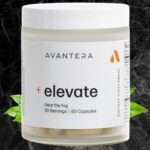
Avantera Elevate is one of the newer nootropics to gain traction, particularly with younger professionals and health-conscious users. Its formula is much more streamlined than Brainol’s, with a clear focus on mood, energy, and gut health.
It includes ingredients like turmeric for inflammation, ashwagandha for stress reduction, and probiotics for gut-brain support, alongside a modest dose of caffeine from green tea extract.
Where Elevate shines is in its lifestyle positioning. It’s marketed not just as a brain booster but as part of a broader wellness routine. And to its credit, the ingredients are transparently listed and dosed more realistically than many competitors.
The ashwagandha and turmeric, in particular, are present at meaningful levels that can genuinely help with stress and recovery.
That said, Elevate is less of a pure cognitive enhancer and more of a “feel good, function well” product. It doesn’t deliver the sharp focus or memory improvements that research-backed nootropics like citicoline or Bacopa can provide.
In my experience, it made me feel calmer and more balanced, which is valuable, but it’s not the supplement I’d reach for when I need to be at peak mental output.
For users who are drawn to natural wellness and want something that doubles as a light nootropic and a stress-support supplement, Elevate is a better choice than Brainol. But if your goal is maximum focus and memory performance, you’ll want to look elsewhere.
You can read my Avantera Elevate review for my experience.
Frequently Asked Brainol Questions
How long before I see results?
For most users, any noticeable effects come fairly quickly. The guarana–theanine pairing can kick in within 45–60 minutes, making the first few hours of the day feel more productive.
However, if you’re hoping for long-term improvements in memory or learning, Brainol is unlikely to deliver. Ingredients like Bacopa are underdosed and need weeks of consistent use at proper levels to work. So think of Brainol as a short-term focus lift, not a long-term cognitive builder.
Can I take Brainol with other supplements?
It depends. Stacking Brainol with a standard multivitamin is redundant, since the formula already includes high doses of B vitamins. Combining it with other nootropics is also tricky because of the 400 mcg of huperzine A.
Most importantly, St. John’s Wort interacts with many medications, from antidepressants to birth control, so if you’re on prescriptions, you should avoid Brainol altogether unless cleared by a doctor.
What happens when I stop taking it?
Because Brainol’s benefits come mainly from short-acting compounds like caffeine, theanine, and huperzine A, stopping doesn’t cause withdrawal. The mild focus and clarity you get while on it simply fade, usually within a day or two.
There’s no evidence of long-term brain changes from the doses provided here. You might even sleep better once you’re off, since the huperzine A won’t be building up in your system.
Is the money-back guarantee real?
Yes. Consumer Health, the company behind Brainol, offers a 60-day money-back guarantee. Customer reports confirm that returns are honored, though you’ll need to cover return shipping and follow their process. It’s not the most generous guarantee in the industry, but it does lower the risk if you want to test Brainol without committing to a long supply.
Summary
Brainol is a supplement that tries to cover every angle of brain health in a single formula. It succeeds in a few areas but the downsides outweigh the positives.
Magnesium is in the least absorbable form, Bacopa and tyrosine are far too underdosed to work, and glutamine and DMAE add little to nothing.
The inclusion of St. John’s Wort raises interaction risks, and huperzine A is dosed so high that it should really be cycled, not taken daily. Brainol ends up feeling broad but shallow with lots of ingredients listed, few actually effective at the provided amounts.
If you’re curious, the 60-day guarantee makes it relatively low risk to try. But if you’re serious about long-term cognitive support, I’d recommend Mind Lab Pro instead. Its formula is cleaner, safer, and dosed in line with clinical research. For consistent memory, focus, and clarity across the day, it’s the better investment.
Mind Lab Pro
Mind Lab Pro Nootropic Brain Supplement
Non-Stimulant Nootropic For Instant Brain Boost
Boost brain power & reduce cognitive decline.
CHECK CURRENT DEALS
